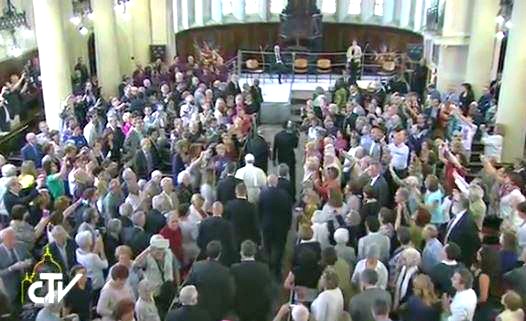From Vatican Radio:
On the second day of his Apostolic Visit, Pope Francis made an historic visit to the Waldensian temple in Turin. Although numbering only about 30,000 adherents, the Waldensian Evangelical Church is an important dialogue partner with the Catholic Church, as it is one of the only non-Catholic Christian communities native to Italy. The early morning meeting marked the first time a Pope had visited a Waldensian house of worship. Pope Francis began his speech to representatives of the Italian Waldensian community with a brief personal remembrance of his previous meetings with the friends of the Waldensian Evangelical Church of Rio del Plata, when he was Archbishop of Buenos Aires. The Pope spoke of his appreciation of the “spirituality and faith” of those meetings, from which he “learned many good things.” The Pope went on to speak about the fruits of the ecumenical movement in recent years. The principle fruit, he said, “is the rediscovery of the fraternity that unites all those who believe in Jesus Christ and are baptized in His Name.” This, he said, “allows us to grasp the profound ties that already unite us, despite our differences. It concerns a communion that is still on a journey, which, with prayer, with continual personal and communal conversion, and with the help of the theologians, we hope, trusting in the action of the Holy Spirit, can become full and visible communion in truth and charity.” “But the unity that is the fruit of the Holy Spirit,” the Pope said, “does not mean uniformity. Brothers have in common the same origin, but they are not identical among themselves.” Unfortunately, he continued, historically this diversity was not accepted and was a cause of violence and disputes “committed in the name of the faith itself.” This history, the Pope said, can only grieve us, who pray for the grace “to recognize that we are all sinners and to know to forgive one another.” He then asked for forgiveness for “the non-Christian attitudes and behaviour” of the Catholic Church against Waldensians.
Check out the rest.
More on the Waldensians, from Catholic Encyclopedia:
The real founder of the sect was a wealthy merchant of Lyons who in the early documents is called Waldes(Waldo). To this name is added from 1368 the designation of Peter, assumed by him at his “conversion”, or more likely, attributed to him by his followers. Few details concerning his personal history are known; there are extant, however, two important accounts of the complete change in his religious life; one written about 1220 by a Premonstratensianmonk, usually designated as the “anonymous chronicler of Laon“; the other by a Dominican Friar and Inquisitor Stephen of Bourbon (died about 1262), and dates back to about the middle of the thirteenth century. The former writer assigns a prominent place to the influence exercised on Waldes by the history of St. Alexius, while the latter makes no mention of it but speaks of his acquaintance with the contents of the Bible through translations. The history of Waldes’s conversion may perhaps be reconstructed in the following manner. Desirous of acquiring a knowledge of biblical teaching, Waldes requested two priests to translate for him the four Gospels. In a similar manner he subsequently obtained translations of other Biblical books and of some writings of the Fathers. Through the reading of these works he was attracted to the practice of Christian perfection; his fervour increased when one day he heard from an itinerant singer (ioculator) the history of St. Alexius. He now consulted a master of theology on the best and surest way tosalvation. In answer the words of Christ to the rich young man were cited to him: “If thou wilt be perfect, go sell what thou hast, and give to the poor.” (Matthew 19:21). Waldes immediately put into effect the counsel of the Divine Master. He made over part of his wealth to his wife, part to those from whom he had acquired it, left some to the nuns of Fontevrault in whose monastery he placed his two little daughters, and distributed the greatest part to the poor. On the feast of the Assumption, 1176, he disposed of the last of his earthly possessions and shortly after took the vow of poverty.
From Wikipedia:
The present Waldensian Church considers itself to be a Protestant church of the Reformed tradition originally framed by Huldrych Zwingli and John Calvin. It recognizes as its doctrinal standard the confession of faith published in 1655 and based on the Reformed confession of 1559. It admits only two ceremonies, baptism and the Lord’s Supper.[7]Supreme authority in the body is exercised by an annual synod, and the affairs of the individual congregations are administered by a consistory under the presidency of the pastor. Over the centuries, Waldensian churches have been established in countries as far away from France as Uruguay and the United States where the active Waldensian congregations continue the purpose of the Waldensian movement. The contemporary and historic Waldensian spiritual heritage describes itself as proclaiming the Gospel, serving the marginalized, promoting social justice, fostering inter-religious work, and advocating respect for religious diversity and freedom of conscience.[1] Today, the Waldensian Church is member of the World Communion of Reformed Churches, the World Methodist Council, the Federation of Evangelical Churches in Italy, and the World Council of Churches.

